Saudi Arabia Calls Iran-Backed Hezbollah Threat To Arab States
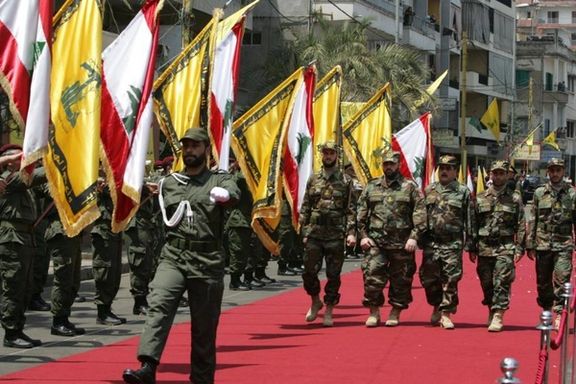
Saudi Arabia’s ambassador to Lebanon has condemned remarks by Hezbollah leader Hassan Nasrallah, expressing hope that Leabnese will end the group's "hegemony" in the country.

Saudi Arabia’s ambassador to Lebanon has condemned remarks by Hezbollah leader Hassan Nasrallah, expressing hope that Leabnese will end the group's "hegemony" in the country.
Earlier this week, Nasrallah called King Salman a “terrorist” and accused Riyadh of exporting Islamic extremism.
Saudi envoy Waleed Bukhari, who left Lebanon in late October, said on Thursday that “Hezbollah’s terrorist activities and regional military behavior” threaten the security of Arab countries.
“Riyadh hopes that political parties will give priority to the supreme interest of Lebanon… and end Hezbollah’s terrorist hegemony over every aspect of the state,” Bukhari said, stressing that ties with Lebanon are too deep to be affected by “irresponsible and absurd statements.”
Lebanese Prime Minister Najib Mikati said criticism of Saudi Arabia by the leader of the Iran-backed Hezbollah group did not serve the national interest or represent the country’s official stance.
Late in October, Saudi Arabia severed diplomatic relations with Lebanon following statements by the then-Lebanese information minister criticizing Riyadh’s military intervention in Yemen. The Saudi foreign minister later said that Hezbollah’s dominance in Lebanon, and not just the minister’s comments, had prompted the Sunni kingdom to cut ties.
Saudi Arabia and other wealthy Arab states always assisted Lebanon, which is struggling with an unprecedented economic crisis since 2019.
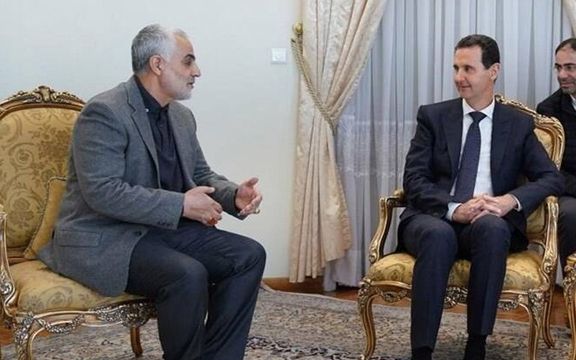
Syrian President Bashar al-Assad has issued a message on the second anniversary of Qasem Soleimani’s killing, saying that the United States targeted him because he was spreading “the spirit of sacrifice” in the region.
Special Adviser to the Syrian Presidency Bouthaina Shaaban read out Assad’s message on Thursday, noting that Soleimani was an obstacle hindering the realization of Washington’s plans for the Middle East.
“Soleimani was a danger to the interests of Washington and its allies in the region” the statement read, adding that in each mission, Soleimani tried to destroy the foundations of the US strategy.
Soleimani intervened early in Syria in 2011, as opposition to Assad was gaining momentum, and began giving advice and support for military confrontation with opponents. Later he spearheaded Iran’s large-scale military intervention in the civil war. Some see him as responsible for the deaths of thousands of civilians.
Shaaban stressed that Soleimani “loved Syria”, which will be “the beacon of resistance”, and will continue the war in the economic and cultural fronts in honor of the blood of “martyr Soleimani”.
“We must remain loyal to Soleimani and work to increase cooperation between Syria and Iran”, she added.
Soleimani, who was Iran’s top military and intelligence operator in the Middle East, was killed by a targeted US drone strike on January 3, 2020, directly ordered by former US president Donald Trump.

Instagram has apologized for a mistake in hiding a hashtag used to highlight those who died when Iran's IRGC shot down a Ukrainian airliner January 8, 2020.
In separate tweets Thursday, BBC Persianand Voice of America's Persian servicereported that in response to enquiries, Meta, mother company of Instagram, has said it had become aware these hashtags had been mistakenly restricted and had taken remedial action.
Instagram hid the hashtag #IWillLightACandleToo and its equivalent in Persian on January 4 in line with its policy of deleting offensive, explicit, or otherwise inappropriate content.
The hashtag was proposed by Hamed Esmaeilion, spokesman of a Canada-based association representing some victims of the downed flight. He lost his wife and daughter in the incident.
"The cyber-army is not leaving the families alone in these black days," Esmaeilion wrote in a tweet, alleging that people “affiliated to the Iranian government” had reported the hashtag to Instagram.
Flight PS752 was hit by two surface-to-air missiles in the tense aftermath of Iran's missile attack on United States military bases in Iraq retaliating for the US killing with a drone strike Iranian general Qasem Soleimani and nine others in Baghdad.
Iran failed to close the civilian airspace, although it said it was expecting a US response. This led to the tragic downing of the plane. Iran claimed a radar mis-alignment and human error.
Ten military personnel involved in the action went on trial in November, but some victims' families boycotted proceedings saying they lacked transparency and due process.
Hackers and heroes
On Tuesday hackers interrupted a video briefing by lawyers for some victims' relatives, playing clips of loud, obscene rap music and showing images including a doll with sharp teeth, a dog with shining eyes, and a man running towards a camera and pretending to kick it.
In recent days, some social media users supporting the Islamic Republic have protested against Instagram, the only major social-media platform not blocked in Iran, for restricting the hashtag #hero used to commemorate Soleimani, commander of the Revolutionary Guards (IRGC) extraterritorial Quds Force, on the second anniversary of his death and for removing photos of the general.
"To take revenge on Instagram, we will take action together to eliminate this malware," read a poster for the Campaign to Eliminate Instagram promoted by Fars News agency, which is affiliated to the IRGC.
According to Fars, the campaign has succeeded in dropping Instagram's rating in the region on Google Play from 4.4 out of five to 2.2 in ratings. The lower rating, Fars wrote, would reduce Instagram’s market value.
Fars said the “more important point” was “the loud message given to Instagram by the Iranian people in protest against censoring their national hero…[and in showing] that they will not remain silent about this cyber terrorism.”
On Thursday the International Coordination and Response Group for the victims of Flight PS752 − made up of Canada, Sweden, Ukraine, and the United Kingdom − issued a statementaccusing Iran of avoiding international legal responsibilities, including by refusing to negotiate with it.
The group said further negotiation was futile and it would “focus on subsequent actions…to resolve this matter in accordance with international law.”Iran has offered to pay $150,000 in compensation for each person lost.
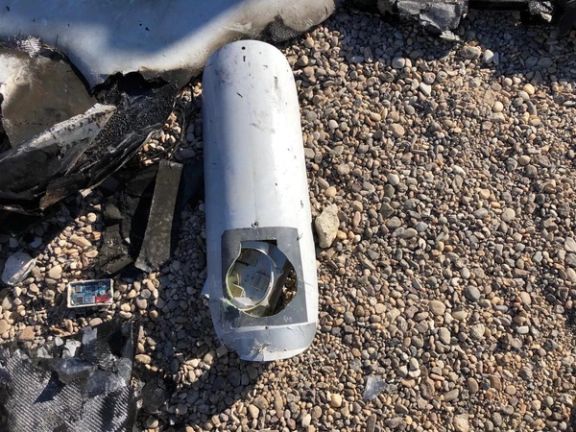
Shiite paramilitary group Qasem al-Jabbarin with links to Iran-backed militias has taken responsibility for the recent attacks on bases hosting US forces in Iraq.
In a statement published by al-Mayadeen, Qasem al-Jabbarin (which means Smasher of the Oppressors) claimed responsibility for the Wednesday attacks on Ain al-Asad air base west of Baghdad.
The group said they launched a dozen rockets from a vehicle in the Bastamiya village, 25 kilometers west of the al-Heet (Hit) district in Iraq’s Al-Anbar Governorate.
US sources said the closest impact was around 2 kilometers (1.2 miles) from the base.
According to a profile on the group by the Washington Institute, Qasem al-Jabbarin is a front group directed by Kataib Hezbollah that specializes in roadside bombings against Iraqi supply trucks servicing the US military in Iraq.
Kataib Hezbollah, itself is part of the Iran-backed Popular Mobilization Forces, led by former Iraqi militia commander Abu Mahdi al-Muhandis before he was killed alongside Qasem Soleimani in January 2020 by a US drone strike.
Pentagon Press Secretary John Kirby said in a briefing on Wednesday that the pace and frequency of such attacks have increased.
Iraqi militia groups aligned with Iran vowed to retaliate for the targeted killings Soleimani and al-Muhandis.
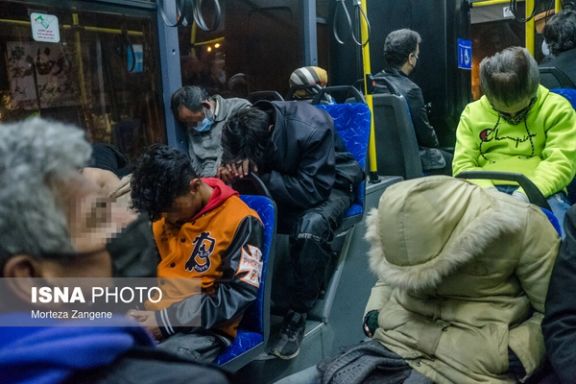
Controversies over "night bus sleepers" and whether to allow people to sleep on city buses have deepened in Iran, as high inflation impoverishes more people.
A photo report headlined "The Night Bus" published by the Iranian Students News Agency(ISNA) has heightened the issue of homeless people sleeping on Tehran buses.
Most are not drug addicts, the report said Saturday, and were people who work but cannot afford the cheapest guesthouses as accommodation. The night bus sleepers told ISNA that buses offered the chance for a few hours’ secure sleep away from shelters they found unsanitary and unsafe. Some said they always sleep in buses.
Ahmad Alavi, a member of Tehran City Council, told ISNA Sunday that municipality officials were aware that night bus sleepers were different from the “typical” homeless who were often addicted to drugs and frequented homeless shelters.
Social media activists responded to the report by suggesting mosques should open their doors for rough sleepers on cold winter nights, while hardliners who control the government and religious institutions opposed the idea on grounds that mosques should be used strictly for religious purposes. Mosques were not "dormitories," tweeted Abdollah Ganji, editor-in-chief of Javan newspaper, affiliated with the Revolutionary Guard.
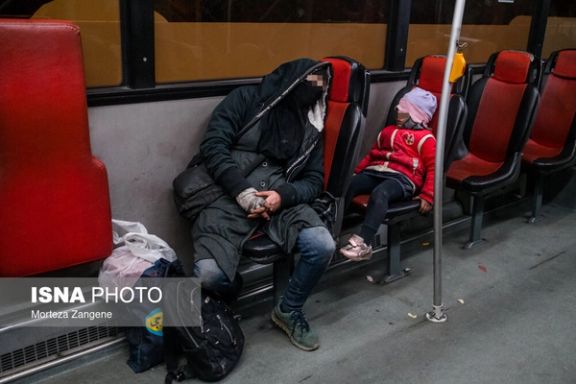
In response, social media users said mosques are being used for state propaganda and housing the Basij, the paramilitary arm of the Revolutionary Guards, and even for economic activities such as cryptocurrency mining which is much cheaply done in mosques due to the special rates they pay for electricity.
There are around 2,000 mosques in Tehran alone. According to Tehran Municipality, Tehran had around 130,000 homeless last year while shelters could only accommodate around 3,000.
Adding to the media hubbub, Mehdi Chamran, conservative chairman of Tehran City Council, said Tuesday he had asked the mayor, Alireza Zakani, to stop people sleeping on buses and to find other accommodation. He said foreign media running the story had “forgotten how garbage scavengers live in London or other places."
Living costs, particularly housing, have risen sharply in Tehran, which according to the Economist's 2021 index of worldwide cost of living jumped from 106th in 2019 to 29th in 2021. The EIU attributed the rise to “continued supply-side constraints, goods shortages and rising import prices following the reimposition of US sanctions.” The EIU ranked Tel Aviv as the most expensive city in the world, followed by Paris.
According to a report by EcoIraneconomic website published January 3, the index for ‘misery’ – adding the unemployment rate to inflation – rose 20 points to 55 points in the twelve months leading to September 2021.
The increase results entirely from rising inflation as government figures, on which the EcoIran report was based, show a fall in unemployment from around 12 percent in summer 2020 to 9.6 percent in 2021.Economists say the figuredoes not include those losing work during the pandemic, and that the government-run Iran Statistical Center considers anyone who has worked for at least one hour a week to be employed. According to ISC,unemployment is at the lowest levelsince 1996, with the center highlighting “the spread of the coronavirus disease which has caused many young adults to leave the labor market.”
The Washington-based conservative Cato Institute, committed to ‘libertarian’ economics, ranked Iran 8th in the world in its Hanke's 2020 Annual Misery Index, with Venezuela as the world’s most miserable country.
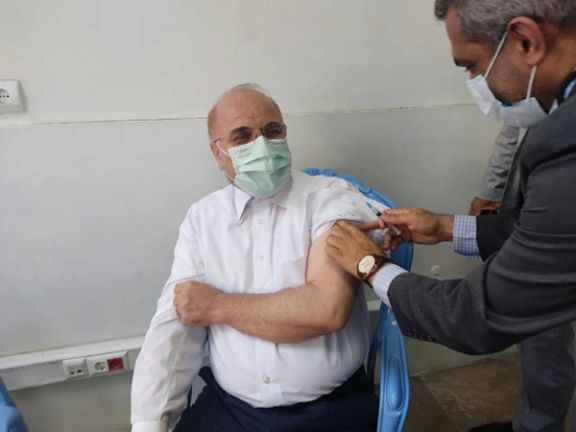
Members of the Iranian parliament have received AstraZeneca as their booster vaccine shot while the brand is not available for other people in the country.
The report about providing AstraZeneca for the lawmakers on Wednesday sparked reactions by Iranians who were desperately looking for the vaccine.
Iran’s health ministry had confirmed the scarcity of AstraZeneca in Iran and urged people to trust the indigenous brands.
Iran’s Supreme Leader Ali Khamenei banned the purchase of American and British vaccines in January 2021, which set back Iran’s inoculation effort. Critics say that as a result tens of thousands unnecessarily died in the fifth wave of the pandemic last year.
Iran embarked on the development of homegrown vaccines, spending hundreds of million of dollars with little result. People do not trust what the government encourages them to accept as domestic vaccines.
Under public pressure, the government imported a limited quantity of Indian-produced AstraZeneca in 2021.
Recently the government announced it will stop importing vaccines as local variants would be sufficient for the country.
Enraged by the apparent discrimination in the distribution of vaccines, many people across Iran have decried the inoculation of lawmakers, asking why officials don’t use vaccines made in Iran.